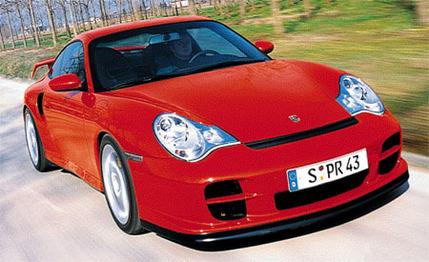 First Drive Review
First Drive Review
At 300 kilometers per hour-that's 186 mph to you, Yankee boy, or more than a mile every 20 seconds-the long, gentle bends of the Italian autostrada north of Venice morph into real turns, replete with significant g-loading, and the car's motions are lively as it tracks nervously over inequalities in the seemingly smooth pavement.
Although its behavior is well short of anything that could be called skittish, keeping the car on its proper line demands unwinking concentration as the speedometer needle twirls toward the top end of its scale. The closing rate on slower traffic is eye widening, particularly when the sweeping curves occasionally limit downstream vision to a quarter-mile. It's an eye-widening drive-but seriously addictive nonetheless. And even with the odometer clicking over at this heady rate, the car still feels eager to deliver more, gobbling up kilometers with an appetite that seems insatiable.
There is, in fact, more on tap, though not a lot. The Porsche 911 GT2 tops out at 315 kilometers per hour, according to Porsche-196 mph, and more to the point, a shade faster than the 911 Turbo, which is all through at 192 mph. But there's a distinction that's obviously academic.
The real difference between the two Porsche missiles lies in the sensations the GT2 generates en route to these celestial velocities, and in its behavior on demanding mountain roads. With more power spooling out of its twin-turbo 3.6-liter flat-six, and less weight-about 220 pounds-to propel, the GT2 is quicker than its more civilized cousin. According to the usual conservative factory estimates, it should do 0 to 62 mph (100 km/h) in 4.1 seconds, 0 to 100 mph (160 km/h) in 8.5, and 0 to 124 mph (200 km/h) in 12.9. Porsche's 0-to-62-mph and 0-to-100-mph estimates for the 911 Turbo were 4.2 and 9.2, respectively, but our own test data (C/D, September 2000) pegged 0 to 60 at 3.9 seconds, and we'd expect the GT2 to do even better.
Beyond that, there's this bigger issue of character. Although the latest 911 Turbo is arguably the most awe-inspiring combination of speed, sophistication, and sure-footed composure to come down the pike, an almost foolproof supercar, it's drawn flak from Porsche purists for the very traits that distinguish it. Its stunning performance is seen as perhaps a tad too cerebral. Even members of C/D's own test corps cited a shortage of passion, complaining that "the Germans have taken the fun out" and calling the 911 Turbo "an appliance for speed."
It seems the Porsche brass in Stuttgart were listening. In fact, the company seems to have anticipated such criticism, because the 911 GT2 was already gestating before the latest 911 Turbo was launched. And it rolls onto the stage as the Turbo's primal sibling, without all those techie contrivances that perform the work that once was left to the driver. There's no all-wheel drive. No disappearing rear wing. No Porsche electronic stability-control system (PSM) to intervene on behalf of the driver who's run himself out of talent. Along with the GT2's insistent "Let's go, let's go, let's go," there's an implicit disclaimer line, a serious-drivers-only message that's saying something like, "Look, schmuck, I'm not your mom. You're on your own here."
If the 911 Turbo is the essence of high-speed perfection, a car whose technology makes everything look easy, the GT2 is its street-fighting counterpart, capable of shameless wheelspin, eyeball-flattening acceleration, and generous measures of oversteer, that brink-of-disaster sideways progress that hard-core Porschephiles profess to treasure so dearly.
Addressing the absence of stability-restoring technology, GT2 project manager Hartmut Kristen says, "The entire philosophy of this car is different from the Turbo's. It's for the driver who wants to be able to take his car to its absolute limits on his own."